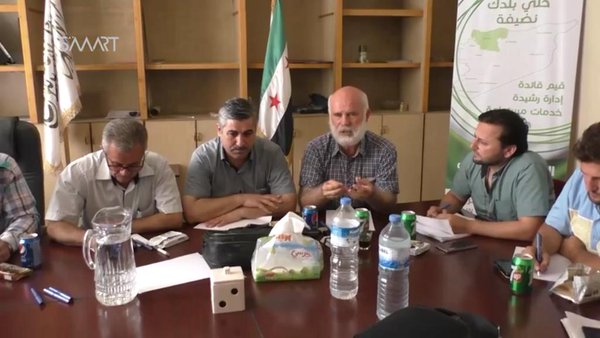PHOTO: A local council in opposition-held area of Aleppo city
In a report for the European Council on Foreign Relations, Jihad Yazigi explains why any political solution for Syria’s conflict must involve a move of some power away from Damascus and to local areas.
The report complements recommendations by analysts at the University of Birmingham, calling for international support and protection of local authority as a short-term alleviation of death and destruction and a foundation for governance, reconstruction, and transitional justice.
See Syria Special: Laying the Foundations for A “Credible Transition”
Syria Op-Ed: Answer to ISIS is Local Councils, Not the Assad Regime
The summary and recommendations of Yazigi’s report:
SUMMARY
Syria now suffers from deep divisions along both ethno-sectarian and geographic lines.
While economic links and interdependency persist between the various parts of the country, and most Syrians remain remarkably attached to the idea of national unity, the country is fragmenting into competing centers of power. This fragmentation extends to government-held areas where local power brokers are also asserting independence, challenging Damascus’s ability to hold on to power.
Political and economic decentralization, including a special status for Kurdish areas, is fast becoming a necessary condition for solving the conflict. For this to become a reality, there needs to be a formal devolution process, fairer allocation of resources — particularly oil revenues — and efforts to reduce disparities in economic development.
European actors should recognize the reality on the ground and shift their focus away from achieving a centralized power-sharing agreement and towards negotiations based on a devolved politics. A decentralized model will be difficult to implement, but ironically may offer one of the few means of holding the country together.
POLICY RECOMMENDATIONS
*Syria should adopt a decentralized political system based on the transfer of power away from Damascus and towards the governorate and district levels. Kurdish regions should get a special status with enhanced powers, as part of asymmetric decentralization.
*While decentralization is implemented and communities are recognized as political actors, the central state should retain a monopoly on a number of key sovereign attributes including defense, foreign affairs, and the printing of money.
*Syria’s official name should no longer contain the word “Arab”. This symbolic move would be in line with the overwhelming number of Arabic countries, including Iraq and Lebanon, and would send a positive signal to non-Arab Syrians.
*The state should teach all children from minority groups in their mother tongue. In Kurdish areas in the northeast, and Kurdish-majority districts of Damascus and Aleppo, schools should teach in Kurdish as well as Arabic.
*The state should ensure that it uses its available tools to limit geographic disparities in economic development. For instance, access to employment in each governorate should be based on its share of the country’s total population. Where possible, the same rule should apply to public investments.
*Oil export revenue should be reallocated, guaranteeing a proportion equal to each province’s population, on the principle that oil resources are equally owned by the entire country.
*Sectarian and ethnic communities should get some form of political representation at the central level. A bicameral system could be a solution. However, the Russian proposal to appoint government members on the basis of their religious or ethnic affiliation would go too far in terms of institutionalizing these divisions, and would be a recipe for gridlock. Instead, community representation should be pushed at the legislative level, in an upper house tasked with monitoring and control and with preventing discrimination. At the executive level, there should be no appointments or allocation of official positions based on sectarian or ethnic affiliations.

